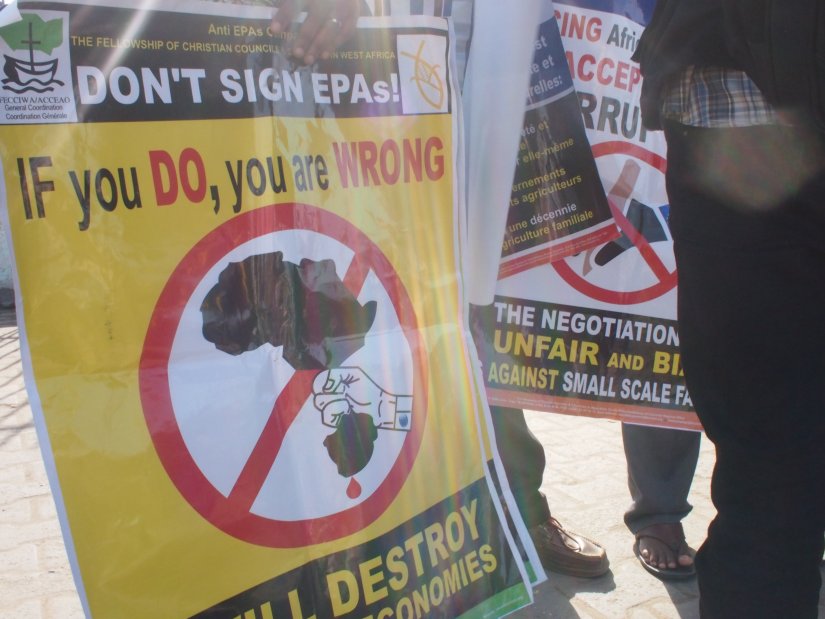Africa prepares to drive a hard trade bargain with EU
Euractiv | 3 September 2018
Africa prepares to drive a hard trade bargain with EU
By Benjamin Fox
Increasing trade between the EU and the ACP (African-Caribbean-Pacific), particularly African countries, lay at the heart of the ambition of the Cotonou Agreement. That was supposed to be embodied by regional Economic Partnership Agreements (EPA) with the EU.
But it has not worked out that way. Eight percent of EU exports and less than 7% of EU imports came to and from Africa in 2016.
Slow to be negotiated, in large part because many African regional blocs felt the European Commission was pushing them to open up access to their markets to European firms, only one EPA has been successfully ratified, with the six-member Southern African Development Community (SADC).
No way, EPA
The sense that African countries won’t allow themselves to be pushed around by the EU on trade is held by Carlos Lopes, appointed in July as the African Union’s High Representative on the post-Cotonou talks.
“The reality is clear that the EPAs were badly negotiated and apart from the SADC, most of them are not implemented,” he told EURACTIV.
He added that the deadlines attached to agreeing and ratifying the EPAs were “artificial to give an impression that they were the only way to get access to the European market.”
Many African countries can already trade largely duty-free with the EU as ‘least favoured nations’ and felt that the EPAs offered them little.
Tanzanian officials have described the proposed EU EPA with the East African Community as “skewed and exploitative”, and such views are shared by a number of governments.
At a G20 meeting in Berlin last June, German Chancellor Angela Merkel called for a number of the regional EPAs to be re-opened, while her development minister Gerd Muller called in July for all EU imports from Africa to be tariff-free.
In the meantime, the recent push by African countries towards an African Continental Free Trade Area (ACFTA) is also redrawing the international trade map, and African leaders believe that they will negotiate the successor to Cotonou and, potentially, the EPAs, from a position of much greater strength.
Forty-nine out of 54 African countries have signed the ACFTA and Lopes is confident that all bar isolationist Eritrea will have signed up to it by January 2019.
“There is a political push in Africa for the continental free trade area to be the main instrument through which to conduct trade with Europe,” Lopes said and added that it would be “very much in the interest of the EU to do this”.
“Europe is the number one trading partner as a bloc but its position has been eroded,” he said.
“Contrary to perceptions, Africa is not a minor partner when it comes to trade to Europe. We are the third largest partner with the EU after the US and China. The African Union recognises that we are stronger when we negotiate as one voice.”
Meanwhile, Britain’s pending exit from the EU, and the UK government’s publicised wish to strike its own trade pacts with Commonwealth countries, also increases the prospects of fragmentation.
For the moment, the UK is not in a position to offer substantive trade talks but has promised that it will continue to offer ‘duty-free-quota-free access to the UK market’ for countries classified as ‘least developed’, alongside a ‘unilateral trade preference scheme’ that could potentially outflank the EPAs.
Mitumba Ban
But it is not just the EU with whom African countries are becoming assertive. In July, Rwanda was suspended by the United States from the African Growth and Opportunity Act, a law signed by George W. Bush in 2000, the same year as Cotonou. AGOA, which offers duty-free access to the US market for about 7,000 products, has been the US’s flag-ship trade bill with Africa for nearly two decades.
In 2017, the six-country East African Community sought to impose tariffs on imported second-hand clothing and shoes, on the grounds that they wanted to build up domestic textiles markets.
A petition by the US Secondary Materials and Recycled Textiles Association to the US Trade Representative led to a US ultimatum to the six countries – axe the so-called ‘mitumba ban’ or face exclusion from AGOA.
Kenya, which is the region’s largest trader with the US and EU, was the first to back down from the tariffs. Rwanda, however, has refused to blink and has accepted that it will not be allowed to export its clothing to the US – 3% of its total exports to the US.
The Rwandan government estimates that it can create 25,000 jobs locally by phasing out clothing imports.
Alvin Mosioma, executive director of Tax Justice Network, Africa, told EURACTIV that while tax will not be a central issue to the post-Cotonou process, any attempt to curb the right of countries to impose tariffs should be resisted.
“Limiting countries’ ability to impose particular tariffs or taxes to promote their own manufacturing is a huge problem,” he said, pointing out that import taxation accounts for around 11% of government revenue across the continent.
Divide and Rule
The prospect of competing trade offers from the EU, US and UK – not to mention China’s huge economic activities in sub-Saharan Africa – could encourage Africa to adopt a ‘divide and rule’ approach.
The EU, unsurprisingly, cautions against such tactics.
“I’m not sure it will be the best option for these countries to play off the US, Europe and China against each other,” a Commission official told EURACTIV.






